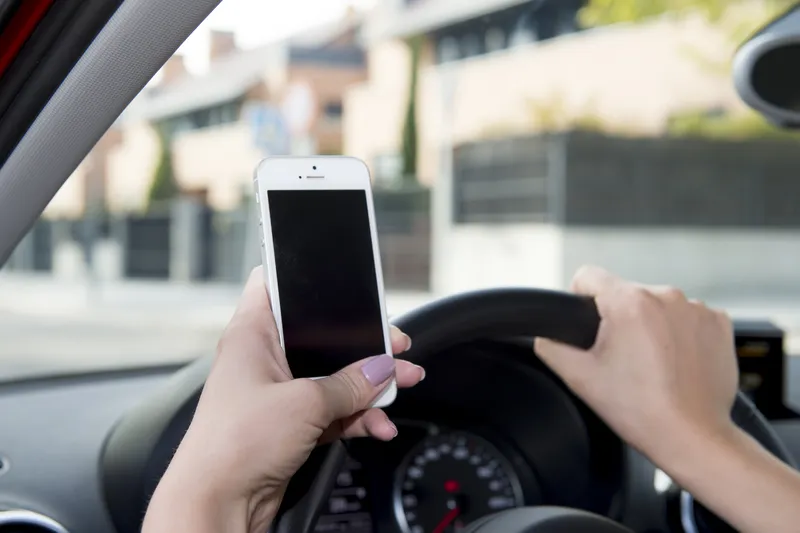There are now calls from right across Europe to increase education, enforcement and penalties for distracted driving. Surveys across Europe have revealed worrying attitudes to the use of mobile devices while driving, according to a report by the European Transport and Safety Commission (ETSC). Campaigners are calling for better enforcement, higher penalties, technological solutions and education to raise awareness of the risks.
A survey in the Czech Republic found that 36% of drivers admitted using their phone almost every time they get behind the wheel. In Spain, 25% of drivers have admitted to using their phone behind the wheel. In Ireland around 25% of drivers using their phone behind the wheel. From Germany, observational research found that, at any given moment, an average of 7% of German drivers are distracted while driving. Traffic Safety Netherlands recently called for distraction to be punished as heavily as drink driving. The organisation also called for enforcement to be stepped up and joined a coalition of 40 bodies backing a commitment to combine forces and reduce driver distraction. Official figures from France show that 9% of fatal collisions occur due to distracted mobile use. In Ireland according to the RSA, distraction is a factor in 20-30% of collisions.
A new study from the UK’s
Drivers checking social media is the biggest single perceived threat that road users feel – slightly higher than those who text and email, and closely followed by drink and drug drivers.
The survey of more than 2,000 motorists found that more than 90% thought that the dangers caused by people accessing social media or email messages while driving was a significant threat to their personal safety. They also thought that the problem is increasing, with 80% believing the problem more significant than three years ago.
Driving while under the influence of alcohol or illegal drugs also remains an issue, with 90% of drivers surveyed identifying this as a serious safety problem. Around half of the drivers surveyed believe the dangers posed by drink-driving have remained the same over time. But those surveyed think that the problem of people driving under the influence of drugs is increasing, with 64% believing this to have worsened over the last three years.
Other key risks to personal safety on the road identified in the survey include talking on mobile phones (89%), speeding on residential streets (87%), drivers ignoring red lights (87%) and tired drivers (86%). Aggression behind the wheel was also identified as a problem, with 75% of those surveyed believing this a danger to their personal safety.
When asked about their own driving habits, about one in three (30%) said they drove slower than others on the road, while just over half (55%) said they drove at the same speed as others around them. Only one in seven were willing to admit to going faster than everyone else.
IAM RoadSmart’s survey also found there is little tolerance for breaking motoring laws; 50% of drivers feel it is unacceptable to drive 16km/h (10mph) higher than the speed limit on a motorway. This figure falls substantially for other forms of speeding such as driving at 8km/h (5mph) more than the limit on a residential road (76% unacceptable), and driving at 8km/h greater than the limit near a school (90% unacceptable).
While 45% thought it was acceptable to drive using a hands-free phone, that figure drops to just 9% when it comes to a hand-held one.
The least accepted actions surveyed were driving when the motorist thought they had too much to drink (6%) and driving after using marijuana (7%).
When it comes to which motoring transgressions those surveyed had committed themselves, speeding was the one most admitted to. Some 16% said they regularly or often drove 16km/h more than the limit on the motorway, while 14% said they drove 8km/h more than the limit regularly or often on a residential street.
There is also widespread support for tough laws against many motoring offences. Some 96% strongly support laws against reading, typing, or sending a text message or email while driving, while 95% strongly support the law against using a handheld mobile phone while driving.
Meanwhile 93% strongly supported a law requiring all drivers age 85 and older to pass a simple screening test and 91% strongly supported a law requiring all drivers age 75 and older to provide an eye test certificate.
Neil Greig, IAM RoadSmart director of policy and research, said: “In the three years we have been running this survey, people’s worries about drivers using new smartphone technology have remained consistently high. And while public awareness of the dangers of using handheld mobile phones is now good, almost 60% of drivers still believe it is acceptable to use a hands free phone despite growing evidence of the distraction this can cause.
“With three years of data there are several other trends emerging which do cause us some concern. Around a quarter of drivers still feel it is acceptable to speed at 5mph over the limit in residential areas and one in in ten believe it is alright to get behind the wheel after taking alcohol and marijuana. These figure show we have a long way to go before all the dangers caused by reckless driver behaviour are eradicated from our streets. Road safety activities have suffered from recent public spending cuts but our survey shows that key issues still remain that must be tackled through education, training and publicity.”
Distracted driving report from European nations
There are now calls from right across Europe to increase education, enforcement and penalties for distracted driving. Surveys across Europe have revealed worrying attitudes to the use of mobile devices while driving, according to a report by the European Transport and Safety Commission (ETSC). Campaigners are calling for better enforcement, higher penalties, technological solutions and education to raise awareness of the risks. A survey in the Czech Republic found that 36% of drivers admitted using their
December 11, 2017
Read time: 5 mins







